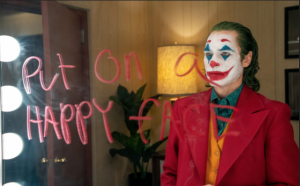JOKER: 4 STARS. “reinvents the character for a new generation.”
 We will never know what Cesar Romero, the first actor to wear the Joker’s scary clown make up, would think about his old alter ego as interpreted by Joaquin Phoenix in “Joker,” but one thing is for sure, he wouldn’t recognize the nihilistic new take on the character.
We will never know what Cesar Romero, the first actor to wear the Joker’s scary clown make up, would think about his old alter ego as interpreted by Joaquin Phoenix in “Joker,” but one thing is for sure, he wouldn’t recognize the nihilistic new take on the character.
Set in a rat-infested Gotham City, the story sees Arthur Fleck, an unstable man doing the best he can with state sponsored therapy and medication. By day he performs as a clown, dancing at children’s hospitals or holding “Going Out of Business” signs on Gotham’s mean streets. At night, when not day dreaming of becoming a stand-up comic, he’s tending to his infirm mother (Frances Conroy). Late at night they cozy up and watch their favorite TV show, a talk show hosted by Merv-Griffin-wannabe Murray Franklin (Robert De Niro). Sometimes Arthur even daydreams that Murray is a warm and loving father figure.
In the real-world things have a grimmer shade. Arthur is constantly harassed by co-workers and, worse, abused by complete strangers. On the day he is fired from his job he fights back, shooting and killing three businessmen who tried to beat him on his subway ride home. When news of the Clown Killer circulates, he becomes the anonymous figurehead of a populist resistance movement. Protestors riot in the streets, wearing clown masks and with signs emblazoned with slogans like We Are All Clowns and Down with Money.
Not that Arthur notices. “I’m not political,” he says. With no job, and, after his therapy program is cancelled, no medication, his extreme behavior escalates. “I’ve got nothing to lose,” he says. “Nothing can hurt me anymore.”
Although ripe with elements from older movies like “Death Wish,” the God’s lonely man favorites “Mean Streets” and Taxi Driver” and echoes from real-life forgotten names like Bernard Goetz, “Joker” is no period piece. It’s as timely as the yesterday’s headlines. A study of everything from alienation and disappointment to the failure of social safety nets and access to weapons, it’s a character study not just of the Joker but of a troubled time. “What do you get when you cross a mentally ill loner with a society who abandoned him?” Joker asks. “You get what you deserve.”
This isn’t a superhero film, there are links and connections to the Batman and Joker stories that came before but this is a horror movie, a look into what happens when the chaos in Arthur’s head becomes manifest. “For my whole life I didn’t know if I existed,” he says, “but now I know I do and people are noticing.” He’s the result of a broken system that turns their back on the mentally ill and underprivileged.
Phoenix, who dropped fifty-two pounds to play the role, displays not just a wasted body, but also spirit in a haunting performance that reinvents the character for a new generation. His take on Arthur finds its roots in marginalized people. “What do you get when you cross a mentally ill loaner with a society who abandoned him?” he asks. “You get what you deserve.” It is a harrowing performance, not always easy to watch, that almost generates sympathy for a broken man who becomes an agent of chaos and one of the DC canon’s greatest villains.
“Joker” drags in its middle section, unpleasantly luxuriating in Arthur’s grim collapse into anarchy, but is held afloat by Phoenix. It may not be a deep or realistic study of mental illness but it showcases Arthur’s weariness at being treated as the cigarette butt under society’s heel.
The message of finding control through vigilante violence is a disturbing one, but IRL it’s one that plays out on the news with disturbing frequency. “Is it just me or is it getting crazier out there?” Arthur asks.
